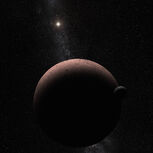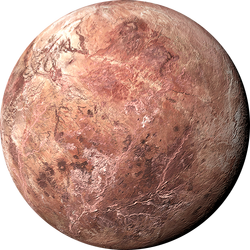(Adding categories) |
(Adding categories) |
||
| Line 13: | Line 13: | ||
[[Category:Numbered Minor Planets]] |
[[Category:Numbered Minor Planets]] |
||
[[Category:Objects Maintaining Hydrostatic Equilibrium]] |
[[Category:Objects Maintaining Hydrostatic Equilibrium]] |
||
| + | [[Category:The Solar System]] |
||
Revision as of 21:53, 2 June 2020
136472 Makemake is a dwarf planet and perhaps the largest Kuiper belt object (KBO) in the classical population, with a diameter that is about 2/3 the size of Pluto. Makemake has no known satellites, which makes it unique among the largest KBOs and means that its mass can only be estimated. Its extremely low average temperature, about 30 K (−243.2 °C), means its surface is covered with methane, ethane, and possibly nitrogen ices.
Initially known as 2005 FY9 and later given the minor-planet number 136472, it was discovered on March 31, 2005, by a team led by Michael Brown, and announced on July 29, 2005. Makemake was recognized as a dwarf planet by the International Astronomical Union (IAU) in July 2008. Its name derives from Makemake in the mythology of the Rapanui people of Easter Island.
Moon

S/2015 (136472) 1

Makemake and MK 2
S/2015 (136472) 1, nicknamed MK 2 by the discovery team, is the only known moon of Makemake. It is estimated to be 175 km (110 mi) km in diameter (for an assumed albedo of 4%) and has a semi-major axis at least 21,000 km (13,000 mi) from Makemake. Its orbital period is ≥ 12 days (the minimum values are those for a circular orbit; the actual orbital eccentricity is unknown). Observations leading to its discovery occurred in April 2015, using the Hubble Space Telescope's Wide Field Camera 3 and its discovery was announced on 26 April 2016.
| The Planets and Dwarf Planets | |
|---|---|
| Planets | |
| Mercury • Venus • Earth • Mars • Jupiter • Saturn • Uranus • Neptune | |
| Dwarf Planets | |
| Ceres • Pluto • Haumea • Makemake • Quaoar • Eris | |
